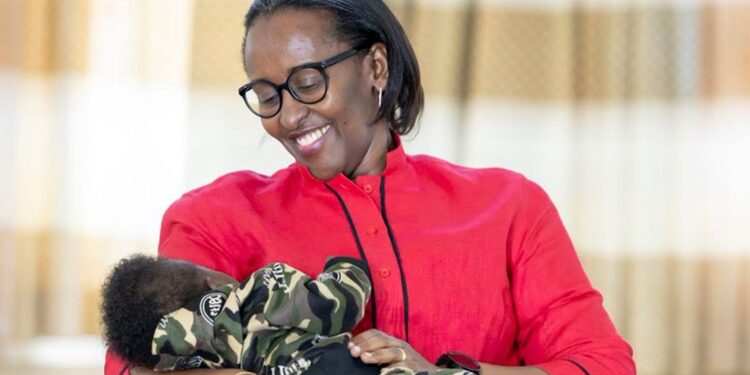In recent days, we shared a special message about couples. Today, I return to reflect on another extraordinary blessing of marriage: being called “parents.”
A child is truly a blessing! Allow me to take you on their first journey so we can understand that nothing is greater than a child. When a newborn grasps their parent’s finger in their tiny fist, you feel their sense of security.
And for the parent too, there is an instinct to always remain close. Even when a child grows up, they remain a child in their parent’s eyes.
A parent loves their child more than they love their own life! It is not always easy. Often, parents are guided by the deep desire to prepare their child for tomorrow, worrying about what could harm them. This may appear as strict monitoring, correcting, or constantly reminding them to do better.
Although this can sometimes be misunderstood, a parent never does it out of selfish interest or ill will.
There are moments one wishes children could feel what parents feel—the sleepless nights, the constant prayers, the sacrifices. Perhaps then children would not see only rules or pressure, but would recognize the love and kindness behind it.
The Role of Parents
You know I often write to you about family. The reason is simple: I believe a united and secure family creates a foundation for a peaceful nation.
When I write, it is not because I have all the answers, but because I want us to reflect and advise one another.
Today, I wish us to talk about parenting—raising children within secure families, raising children who will defend Rwanda!
Parenting is not always an easy calling or responsibility. As the saying goes, “no one is without flaws.”
Just as a child does not choose where to be born, parents also do not choose the children they will have, nor can we shape them to fit our ideal image. So—can one really parent well? What does “good parenting” even mean?
Human beings live on faith and hope, always striving for the best, yet never free from worry.
In today’s world, which has become a “global village” shaped by technology, a person can live and act like those from distant places without ever being there. This creates many challenges for raising children.
It leads us to ask: how do we raise complete Rwandans, future leaders who will love their country and place it above all else?
These are no longer just questions for reflection; too often we are distracted by the lure of technological trends and competition, forgetting that a strong nation is not only built on vision but also on upright citizens who will carry that vision forward.
We often say a child belongs to the family. But let us pause—what is the family like today? Does it still comfort the child, or does it burden them, especially when they fall short of expectations?
As Rwandans, we believe that dignity and integrity require resilience. While instilling this in the young, we must also remember that kindness, listening, and guidance are vital. Children need understanding, companionship through growth, mistakes, and corrections.
When children feel unheard or neglected, mocked for their differences, or nicknamed unfairly, their feelings may be deeply wounded. Some may go silent, but silence is not permanent. Suppressed emotions may later erupt in anger, withdrawal, or harmful behavior.
Non-violent Parenting
Every parent loves their child beyond measure, believing they are destined for greatness. Yet when things do not go as hoped, some parents quickly label their children in negative ways—“quiet,” “difficult,” “troublemaker”—forgetting that every child is complex and cannot be defined by a single word.
Depending on their stage in life, a quiet child may be mistaken for disabled, a cautious child undervalued, a curious child called disobedient, and an energetic child seen as disruptive. Such labels may comfort parents and teachers but wound children deeply, restricting their freedom and growth.
We forget that each child has unique traits and gifts, often linked to their family background.
Parenting has no rigid formula. Firstborns often grow with inexperienced parents learning along the way, while younger siblings are raised by parents who may be more tired but more knowledgeable. Even siblings raised together differ.
By insisting children behave exactly as we wish, we sometimes fail to value the sacred responsibility of parenting.
Correcting with kindness, listening more than scolding, and guiding without humiliation—these are not signs of weak parenting, but of mindful parenting that recognizes the different stages of childhood.
As the philosopher Jean-Jacques Rousseau said, children see the world differently than adults; we should not demand that they think like grown-ups. They have their own ways of understanding life appropriate to their age.
If we respect this, we will not misinterpret their behavior as illness or disobedience. Intelligence does not appear the same in every child. The restless child might become an extraordinary entrepreneur. The misunderstood one might grow into a gifted artist.
Too often, families and schools categorize children, thinking it will help their growth, but instead this isolates them, leaving them feeling excluded. Such alienation can lead to problematic behavior—not because they were born that way, but because society failed to nurture them properly.
What Should We Do?
Parents must learn to correct with kindness, discipline without humiliation, and respect children’s feelings and aspirations. We need families that are inclusive and attentive, where children feel safe and valued.
Children should be given the space to explore, to err, and to learn. They should not be constantly compared to others or crushed with negative words, but encouraged with affirmations that build confidence.
Love should not blind parents into overprotection. It should guide them to prepare children to face life’s challenges with resilience.
Allow me to leave this message:
A well-raised child is not one shielded from hardship, but one nurtured with love, taught compassion, self-confidence, ambition, and resilience. A child who learns that mistakes are lessons, not the end of life.
To our young people: sometimes you may feel parents pressure or control you, but know it comes from love and experience. If it were possible, parents would remove every obstacle from your path—but life does not work that way. You must play your part in shaping your own purposeful life, with the support of those who love you.
To parents: remember, “A seed planted in fertile, well-prepared soil and given all essentials will grow into a strong tree unshaken by the winds.”
If we want children to become capable Rwandans—undaunted by life’s struggles, but creative, resilient, and driven by curiosity rather than fear—then we must instill in them resilience and confidence.
In conclusion, let me remind us once again: the family is the foundation of the nation. The uniqueness of our country begins in the family. Unity in the family and the nation has shown us that together, we can achieve more than we imagined. Let each of us care for every child as our own, raising a generation ready to serve and defend Rwanda.
Thank you sincerely for receiving this message.
I wish you all a happy day of patriotism.











